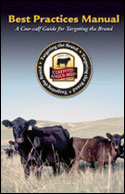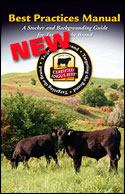Revisions to Texas Cattle Trichomoniasis Regulations Adopted
Changes to Texas' cattle trichomoniasis, or "trich," regulations were adopted Oct. 5 by the 13 governor-appointed leaders of the Texas Animal Health Commission (TAHC) and will become effective in November 2010. Andy Schwartz, TAHC assistant state veterinarian and epidemiologist, discussed the program and outlined rule changes for board members of the Independent Cattlemen's Association of Texas (ICA).
Cattle trichomoniasis, a venereal disease of cattle, can cause cows to abort very early in their pregnancy and be slow to re-breed. Cows, given sexual rest, may clear the disease, but infected bulls become lifetime carriers and transmitters of the "trich" organism. To protect against the spread of the disease, testing regulations went into effect in January 2010 for Texas breeding bulls undergoing a change of possession, about nine months after rules were imposed for breeding bulls entering the state.
Schwartz reported that several rule changes were in the works, in response to recommendations from the yearly industry-led review of Texas trichomoniasis program. One adopted rule change will extend the validity of the negative cattle trichomoniasis test from the current 30 days to a more lenient 60 days, provided the bulls are not commingled with heifers or cows during the 60 days.
"The industry committee members wanted this change to provide ranchers additional time to sell or move tested bulls," said Bill Hyman, ICA executive director and a member of the review team. "Also, under the revised regulations, the current 30-day 'virgin certificate' is extended to 60 days for young bulls that are exempt from testing prior to change of possession. Furthermore, the virgin certificate will convey to the new owner, who may re-sell the young bull as a virgin within the 60-day time frame, provided the animal has not been commingled with female cattle."
Schwartz said that, under the revised Texas regulations, a negative trichomoniasis test still will be required within the previous 30 days when non-virgin bulls, or bulls older than 24 months of age, are imported into Texas from other states. However, once the animals arrive in Texas, the negative test would be valid for the remainder of the 60-day test window, provided the bulls are maintained away from female cattle during that time.
The revised regulations also exempt out-of-state breeding bulls from an entry trichomoniasis test, if they come from Certified Semen Service (CSS) artificial insemination (AI) facilities, where they are isolated from female cattle. The bulls must be accompanied by documentation, with an original signature by the veterinarian or manager of the facility.
Another of the revised regulations will allow untested, non-virgin Texas bulls to be sold and moved to a feedlot prior to slaughter. Under previous rules, untested, non-virgin bulls were allowed to be sold only for direct movement to slaughter, or for movement under a TAHC-issued hold order to a site away from female cattle, where the bull was to be tested for the disease. Bulls that test negative for cattle trichomoniasis are released from the hold order and allowed to move freely and be commingled with female cattle.
Testing for the disease peaked in March and April 2010, when samples from 5,000 bulls in Texas were shipped or delivered to the Texas Veterinary Medical Diagnostic Laboratory (TVMDL), the state's official trich-testing laboratory. About 3½% of these bulls were infected with the disease.
 Schwartz said that the TAHC has begun notifying fenceline neighbors when an infected bull is detected. The neighbors are encouraged, but not required, to have their bulls tested. Bulls that are confirmed to have trich must be sent to slaughter to prevent the spread of infection.
Schwartz said that the TAHC has begun notifying fenceline neighbors when an infected bull is detected. The neighbors are encouraged, but not required, to have their bulls tested. Bulls that are confirmed to have trich must be sent to slaughter to prevent the spread of infection.
For more information, contact the ICA office at 512-620-0162, or visit www.icatexas.com.
Editor's Note: For more about this disease, see "Trich: Not Just a Western States Disease" in the October 2010 Angus Beef Bulletin.
[Click here to go to the top of the page.]





